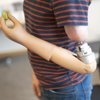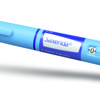Fritextsökning
Artiklar per år
Innehållstyper
-

CROs in drug development: "We use our expertise to speed up the process
Consultancy firms have become an increasingly important part of drug development. “It’s a trend and a business model that works, and we see no indication that it will change,” says Helena Lüning of the industry organisation ASCRO.
-

Dubbelt upp för Korbinian Löbmann
I år blir femte gången Korbinian Löbmann modererar mötet New Updates in Drug Formulation & Bioavailability i Köpenhamn. För första gången tar han sig nu även an kongressen The Future of Swedish & Danish Life Science i Lund.
-

Första pillret mot förlossningsdepression godkänt i USA
Den första orala behandlingen specifikt inriktad på förlossningsdepression har godkänts av FDA.
-

Uppsala-based company wins important patent dispute – but the decision is subject to appeal
A US district court has ruled in favour of Orexo in a dispute over the patent protecting the Swedish company’s drug Zubsolv, developed for treating patients with opioid addiction. However, the opposing party, the Indian company Sun, is not giving up and has filed an appeal.
-

Nytt europeiskt patent skyddar formulering från Index Pharmaceuticals
Index Pharmaceuticals har beviljats ett nytt europeiskt formuleringspatent för sin läkemedelskandidat cobitolimod som utvärderas som behandling av ulcerös kolit, kronisk inflammation av tjocktarmen.
-

Uppsalabolag fick rätt i viktig patenttvist – men beslutet överklagas
En amerikansk distriktsdomstol har beslutat till Orexos fördel i en tvist om patentet som skyddar det svenska bolagets behandling Zubsolv för patienter med opioidberoende. Men motparten, indiska Sun, ger sig inte utan har lämnat in ett överklagande.
-

Protesforskare frias från misstankar om oredlighet
De Göteborgsforskare som utelämnade information om svåra komplikationer hos en patient som fått en tankestyrd armprotes frias från misstankar om oredlighet i forskning.
-

The Swedish Life Science Office: “We lost in both coordination and manpower”
Since the turn of the year, the Swedish government’s life science office has operated at a lower capacity. Life Science Sweden has spoken to Pontus Holm, Departmental Secretary at the office, about the ongoing work.
-

Neanderthal gene variants may cause Viking disease
A new study suggests that the so-called Viking disease, which affects the hand function in many older people, may be linked to gene variants inherited from Neanderthals.
-

Glad sommar! – och chefredaktörens lästips
Life Science Swedens chefredaktör sammanfattar året hittills och ger lästips inför sommaren.
-

Lucy Robertshaw: Artificial intelligence – is this really going to transform a patient’s life?
In a column Lucy Robertshaw reflects on how AI and new regulations will affect healthcare, innovation and the lives of future patients.
-

Gothenburg-based company acquired by Norwegian diagnostics group
Gentian Diagnostics acquires Gothenburg-based Getica.
-

Attgeno stärker kassan för fortsatt fas II-studie med kväveoxid
Bioteknikbolaget Attgeno, som utvecklar ett läkemedel mot akut pulmonell hypertension (APH), har genomfört en riktad nyemission till befintliga aktieägare som tillför bolaget 12 miljoner kronor.
-

Studie: Taurin gav längre livslängd för djur
Möss, ormar och apor som fick aminosyran taurin under en längre tid uppvisade mindre åldersrelaterade tecken än kontrollgrupper, enligt en studie.
-

Anna Törner: The minute between life and death
“I have never told anyone about this day that happened more than 20 years ago. But I sometimes reflect on what happened, on what might have happened. When I try to understand why I haven’t told anyone, I find the answer: a feeling of shame. There is no forgiveness for something like this, even though it is very human to be distracted for a moment,” Anna Törner writes in a column.
-

Novo Nordisk invests billions in expanding its production capacity
Danish pharmaceutical company Novo Nordisk is making a major investment to develop and expand its production facility in Hillerød, north of Copenhagen. DKK 15.9 billion, equivalent to almost SEK 25 billion, is being invested over six years.
-

AstraZeneca moves to brewery quarters in central Copenhagen
AstraZeneca in Denmark is moving its business into central Copenhagen and the old brewery quarters in Carlsberg Byen.
-

Nanexa develops depot formulation of the diabetes and obesity drug Saxenda
Uppsala-based company Nanexa has signed an agreement with a German contract research company to start a clinical study with a monthly depot of liraglutide. The drug is currently approved for the treatment of diabetes and obesity.
-

Nanoparticles to help detect pulmonary disease
Nanoparticles behave in a certain way in the air. Using this knowledge, researchers at Lund University have developed a new measurement method for lung examinations based on the phenomenon.
-

Index Pharmaceuticals tecknar japanskt licensavtal
Svenska läkemedelsutvecklaren Index Pharmaceuticals har nu tecknat ett licensavtal med Viatris Japan.
-

Getinge stärker närvaron på läkemedelsområdet i miljardaffär
Getinge förvärvar amerikanska High Purity New England, som tillverkar engångsprodukter för bioprocesser. Den svenska medtech-jätten betalar närmare 1,3 miljarder direkt, men affären kan växa till att kliva över tremiljarderstrecket.
-

This is the future location of the new national innovation cluster
Mölndal and Goco Health Innovation City will be the site of a new national innovation cluster for advanced therapies. The business community and the Swedish government are splitting the costs of the project, which is expected to produce new treatments
-

Rapid developments in AI – “All stakeholders are struggling to understand it”
Artificial intelligence is being discussed more and more, and developments in the field are moving rapidly. As the Swedish Medical Products Agency testifies, keeping up with developments is not easy.
-

Samuel Lagercrantz: The government’s performance in healthcare and life sciences so far
Since the change of government in Sweden, developments in the healthcare sector have shown promising signs, but the outlook in life sciences is less promising, writes Samuel Lagercrantz in an editorial.